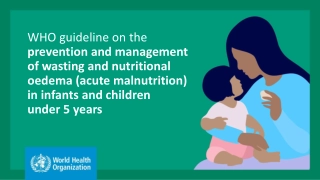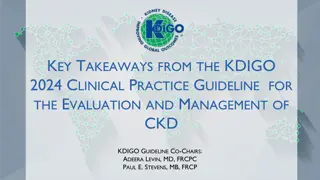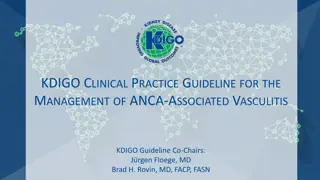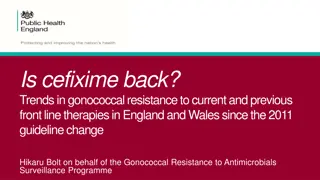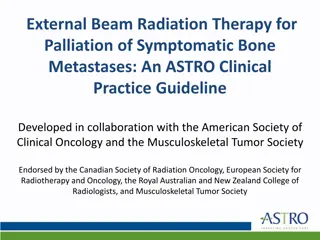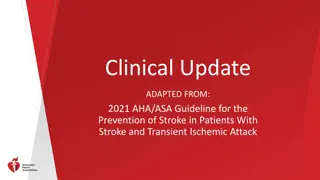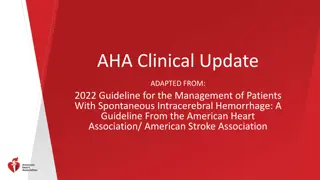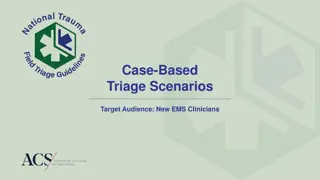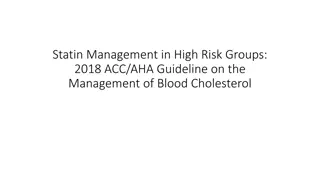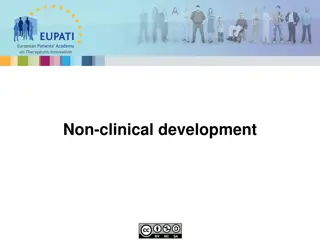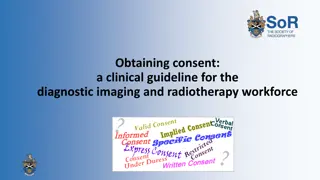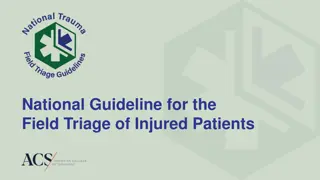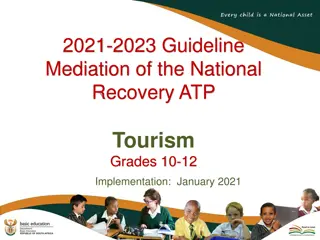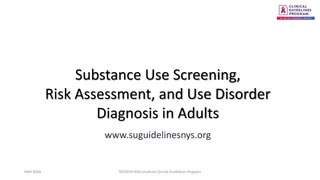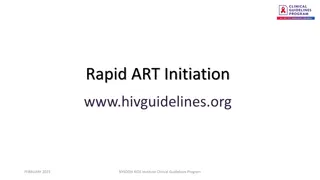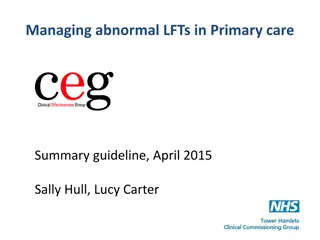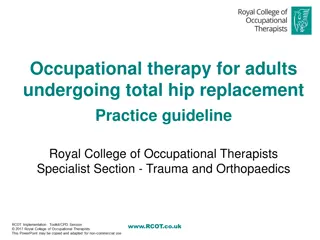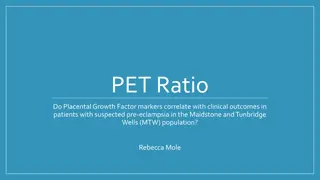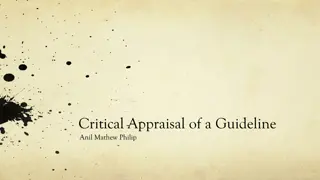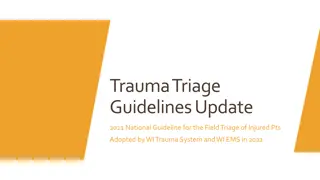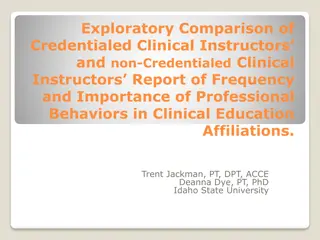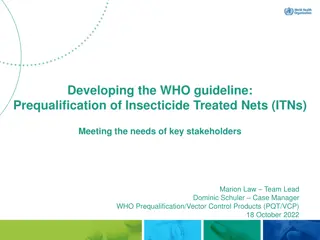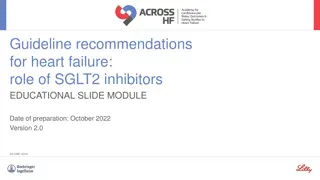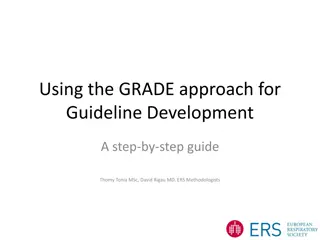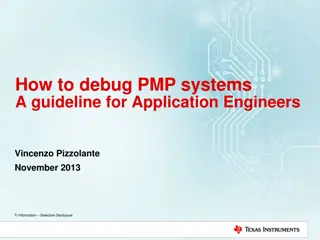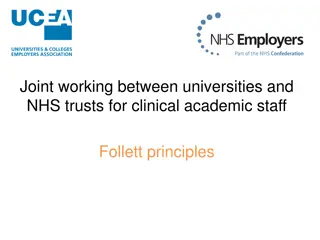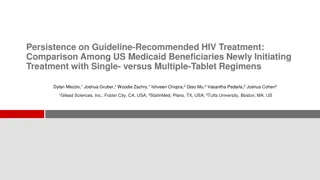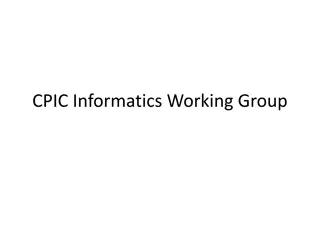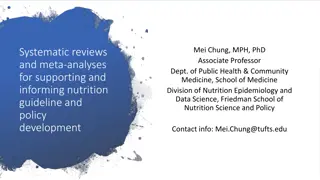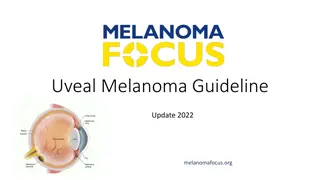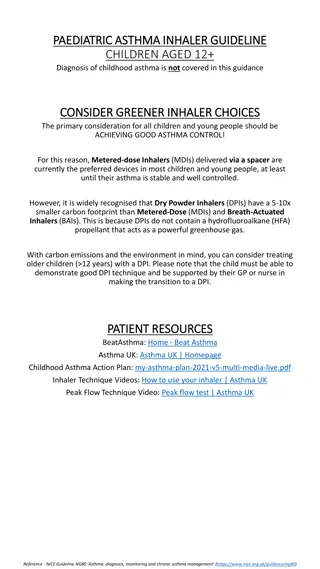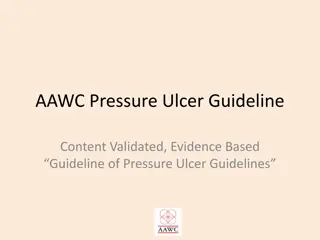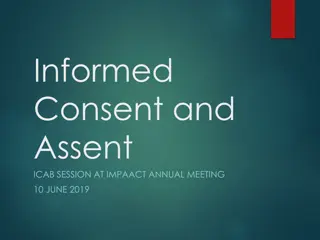WHO Guideline: Prevention & Management of Malnutrition in Infants & Children
Key insights from WHO's guideline on managing wasting and malnutrition in children under 5. Covers assessment, care for infants and mothers, and treatment strategies for different malnutrition levels
3 views • 37 slides
Key Takeaways from KDIGO 2024 Clinical Practice Guideline for CKD Evaluation and Management
The KDIGO 2024 guideline emphasizes the importance of evaluating and managing Chronic Kidney Disease (CKD) effectively. It highlights defining CKD, distinguishing between AKD and CKD, personalized care across the lifespan, diagnosing CKD in older adults, and improving the accuracy of GFR assessment.
1 views • 24 slides
Occupational Therapy and Play Practice Guideline Learning Session
Explore a comprehensive occupational therapy guideline focused on play practice for children and young people aged 0-18 in the UK. The guideline covers objectives, usage instructions, assessment, intervention recommendations, and more. Embrace evidence-based practices to enhance therapy outcomes and
4 views • 37 slides
KDIGO Clinical Practice Guideline for ANCA-Associated Vasculitis
This guideline provides detailed information on the management of ANCA-associated vasculitis as per the KDIGO 2024 Clinical Practice Guideline. It covers guideline development, key statements, and the rationale behind the recommendations. The guideline emphasizes customization for individual use whi
0 views • 46 slides
India Alliance Clinical & Public Health fellowship in India
India Alliance Clinical & Public Health fellowship in India\n\nIndia Alliance Clinical and Public Health Research Fellowships are for Health researchers with an MD, MS, MPH, or an equivalent clinical or public health degree, who can apply for the DBT\/Wellcome Trust India Alliance Clinical and Publi
0 views • 5 slides
Trends in Gonococcal Resistance to Therapies in England and Wales Since 2011 Guideline Change
Antimicrobial resistance in Neisseria gonorrhoeae poses challenges for treatment. This study examines trends in ceftriaxone, azithromycin, and cefixime resistance since the 2011 guideline change in the UK. Data from the Gonococcal Resistance to Antimicrobial Surveillance Programme is analyzed to tra
0 views • 12 slides
ASTRO Clinical Guideline on Palliative Radiation Therapy for Symptomatic Bone Metastases
This ASTRO clinical guideline focuses on the use of external beam radiation therapy for palliation of symptomatic bone metastases, emphasizing its efficacy in pain management and local symptom control. Updated evidence and recommendations address the evolving landscape of metastatic cancer treatment
0 views • 32 slides
Clinical Update: 2021 AHA/ASA Guideline for Stroke Prevention
This clinical update provides guidance adapted from the 2021 AHA/ASA Guideline for the Prevention of Stroke in Patients with Stroke and Transient Ischemic Attack. It categorizes recommendations based on strength and quality of evidence, outlining levels of recommendation and evidence for different c
0 views • 43 slides
Clinical Update on Management of Spontaneous Intracerebral Hemorrhage
This clinical update, adapted from the 2022 guideline by the American Heart Association and American Stroke Association, covers a comprehensive range of topics related to the management of patients with spontaneous intracerebral hemorrhage. It includes information on population health implications,
0 views • 38 slides
Case-Based Triage Scenarios for New EMS Clinicians
These case-based scenarios offer an educational tool for new EMS clinicians to apply the National Guideline for Field Triage of Injured Patients. Developed with hypothetical system resources from diverse community settings, these scenarios prompt users to assess and make triage decisions based on va
0 views • 35 slides
Ethical Issues in Clinical Pharmacy Research by Dr. Haider Raheem Mohammad
Research ethics play a crucial role in clinical trials and therapeutic research in the field of pharmacy. From discovery to validation, all medicines undergo rigorous evaluation processes to ensure safety, efficacy, and freedom from adverse effects. Clinical trials in both animals and humans are ess
0 views • 20 slides
Objective Structured Clinical Examination (OSCE): A Modern Approach to Assessing Clinical Competence
The Objective Structured Clinical Examination (OSCE) is a modern examination method widely used in the field of health science to evaluate clinical skill performance. It involves stations where medical students interact with simulated patients to demonstrate competencies such as history taking, phys
1 views • 40 slides
NIMH Clinical Research Education and Monitoring Program Overview
NIMH's Clinical Monitoring and Clinical Research Education, Support, and Training Program (CREST) aims to ensure the proper conduct, recording, and reporting of clinical trials. This program includes clinical monitoring plans, guidelines for site monitoring activities, and independent clinical monit
1 views • 29 slides
Guideline for Statin Management in High-Risk Groups - 2018 ACC/AHA
This guideline outlines the management of blood cholesterol in high-risk groups according to the 2018 ACC/AHA recommendations. It discusses the overall approach, different statin management groups, justification for statin use in high-risk populations, high and moderate-intensity statin therapy, and
1 views • 14 slides
Understanding Non-Clinical Development in Therapeutic Innovation
The European Patients Academy on Therapeutic Innovation focuses on the non-clinical development phase of medicine, delving into efficacy assessment, safety evaluation, and manufacturing process considerations. Non-clinical studies are essential for decision-making in clinical trials, marketing appli
1 views • 26 slides
Guidelines for Obtaining Consent in Diagnostic Imaging and Radiotherapy
Seeking patient consent is a fundamental ethical and legal requirement in healthcare. This guideline emphasizes the importance of informed consent in imaging and radiotherapy procedures, highlighting the responsibility of healthcare practitioners to prioritize patient needs, values, and autonomy. Th
0 views • 19 slides
National Guideline for Field Triage of Injured Patients Update
The National Guideline for Field Triage of Injured Patients has been updated to incorporate new research and evidence since 2011. This updated guideline aims to reduce time and variation in making destination decisions, with a focus on minimizing under- and over-triage. The process included EMS inpu
0 views • 24 slides
Curriculum Recovery Guideline for Managing Learning Losses: 2021-2023
This guideline outlines the development of a three-year recovery plan to address learning losses caused by the COVID-19 pandemic, focusing on managing teaching, assessment, and learning within a reduced timeframe. It includes strategies, amendments to teaching plans and assessments, and a vision for
0 views • 41 slides
Substance Use Screening, Risk Assessment, and Disorder Diagnosis Guidelines for Adults
This clinical guideline program aims to increase identification of unhealthy substance use among New York State residents and improve access to evidence-based interventions. It provides guidance on substance use screening, risk assessment, and promoting a harm reduction approach for substance use di
0 views • 19 slides
Optimizing Foundational Treatments for HFrEF: Guideline Recommendations and Implementation Strategies
Highlighting the current guideline recommendations for treating patients with Heart Failure with Reduced Ejection Fraction (HFrEF), this educational slide module emphasizes the importance of implementing the recommended therapies effectively. It covers the foundational treatments recommended by vari
0 views • 28 slides
Rapid ART Initiation Guidelines for Managing HIV Infection
This guideline by NYSDOH AIDS Institute outlines recommendations for rapidly initiating antiretroviral therapy (ART) in patients with HIV infection. It emphasizes prompt initiation of ART based on patient characteristics, even prior to confirmatory testing results. The guideline also stresses the im
0 views • 28 slides
Managing Abnormal Liver Function Tests in Primary Care: Summary Guideline
Guideline drafted by Dr. Sally Hull and Dr. Lucy Carter focuses on identifying patients at risk of chronic liver disease, increasing testing for treatable liver conditions, and auditing prevalence of major liver diseases. The importance of diagnosing Non-Alcoholic Fatty Liver Disease (NAFLD) and str
0 views • 23 slides
Occupational Therapy Guidelines for Adults Undergoing Total Hip Replacement
This practice guideline from the Royal College of Occupational Therapists focuses on occupational therapy intervention for adults undergoing total hip replacement. It outlines evidence-based recommendations to maximize functional independence, reduce anxiety, support role resumption, prevent readmis
0 views • 23 slides
Correlation of Placental Growth Factor Markers with Clinical Outcomes in Suspected Pre-Eclampsia Patients at Maidstone and Tunbridge Wells
Study examines the correlation between placental growth factor markers and clinical outcomes in suspected pre-eclampsia patients at Maidstone and Tunbridge Wells. It explores the diagnostic challenges, diagnostic issues, PET ratio test, and NICE guidelines. Objectives include validating marker appro
0 views • 19 slides
Critical Appraisal of Acute Kidney Injury Guideline by Anil Mathew Philip
This critical appraisal evaluates the guideline on Acute Kidney Injury by Anil Mathew Philip using AGREE II criteria. It assesses the scope, stakeholder involvement, rigor of development, clarity of presentation, applicability, and editorial independence of the guideline in detail.
0 views • 29 slides
Field Triage Guidelines Update 2021: National Guideline for Injured Patients
The 2021 update of trauma triage guidelines aims to streamline destination decisions for injured patients. The new guideline emphasizes assessing vital signs, mechanisms of injury, and special considerations to ensure optimal patient outcomes. Key objectives include describing the update process, ex
0 views • 41 slides
Comparison of Professional Behaviors in Clinical Education
Professional behavior characteristics play a crucial role in enhancing student learning during clinical education. This study examines the differences in reported importance and frequency of professional behaviors between credentialed and non-credentialed clinical instructors. The background outline
0 views • 28 slides
Developing WHO Guideline for ITN Prequalification
WHO is developing a guideline for the prequalification of Insecticide Treated Nets (ITNs) to address stakeholders' needs. The consultation session aims to inform stakeholders, share challenges, seek input, and develop the next draft. Guideline principles focus on WHO's mandate, product use, flexibil
0 views • 11 slides
Guideline Recommendations for SGLT2 Inhibitors in Heart Failure
This educational slide module provides an overview of the guideline recommendations for SGLT2 inhibitors in the treatment of heart failure, including HFrEF, HFmrEF, and HFpEF. It covers recommendations from AHA, ACC, HFSA, ESC, CCS, and CHFS guidelines, highlighting the role of SGLT2 inhibitors as a
0 views • 28 slides
Step-by-Step Guide to Using the GRADE Approach for Guideline Development
This step-by-step guide outlines the process of utilizing the GRADE approach for developing guidelines in healthcare. It covers key stages such as formulating questions using the PICO format, selecting and rating outcomes of interest, conducting a systematic review, grading evidence, and translating
0 views • 23 slides
Debugging PMP Systems: A Guideline for Application Engineers
Comprehensive guideline by Vincenzo Pizzolante on debugging PMP systems for application engineers, covering topics like analysis, technical aspects, layout guidelines, trace inductance, case studies, and dealing with noise generators. Includes real-life examples and actionable solutions for managing
0 views • 33 slides
Enhancing Clinical Academic Collaboration Between Universities and NHS Trusts
Clinical academics play a crucial role in integrating clinical practice, research, and education within the NHS. Collaboration between universities and NHS trusts is key to ensure clinical academics address the right questions for patient care and societal benefit. Challenges include an aging clinic
0 views • 29 slides
Sentencing Guidelines Overview for Kansas City, MO - FY 2014
The presentation provides insights into sentencing trends in Kansas City, focusing on departures and variances in relation to the guideline range for the fiscal year 2014. Data from the 2014 Sourcebook of Federal Sentencing Statistics is utilized to analyze the position of sentences for non-governme
0 views • 10 slides
Comparison of Persistence on Guideline-Recommended HIV Treatment Among US Medicaid Beneficiaries
This study compares the persistence rates of newer DHHS guideline-recommended single- and multiple-tablet regimens for treatment-naive patients living with HIV. The analysis utilized the All-Payer Claims Database to assess treatment patterns among Medicaid beneficiaries, highlighting the importance
0 views • 19 slides
CPIC Informatics Working Group Overview
The CPIC Informatics Working Group focuses on the informatics aspects of CPIC guidelines and the clinical implementation of pharmacogenetics. This group aims to support the adoption of CPIC guidelines by addressing technical barriers and creating translation tables from genotype to phenotype to clin
0 views • 7 slides
Role of Systematic Reviews in Nutrition Guideline Development
Mei Chung, MPH, PhD, an Associate Professor in the field of Nutrition Epidemiology and Data Science, plays a significant role in conducting systematic reviews and meta-analyses to support and inform nutrition guideline and policy development. Her work involves identifying research gaps, informing po
0 views • 5 slides
Uveal Melanoma Guideline Update 2022: Summary & Recommendations
This update focuses on the guideline development process for uveal melanoma, detailing the methodology employed by the Guideline Development Group led by experts in the field. The group consists of renowned professionals from various medical backgrounds. The new recommendations touch on aspects like
0 views • 18 slides
Green Inhaler Guidelines for Pediatric Asthma Management
Achieving good asthma control is crucial for children aged 12+ with asthma. This guideline emphasizes the use of greener inhaler choices, such as Dry Powder Inhalers (DPIs), which have a smaller carbon footprint than Metered-Dose Inhalers (MDIs). While MDIs are currently preferred for most children,
0 views • 4 slides
AAWC Pressure Ulcer Guideline: Managing Pressure Ulcers Effectively
This content outlines the AAWC Pressure Ulcer Guideline, providing evidence-based recommendations for assessing, preventing, and treating pressure ulcers. The guideline emphasizes the importance of regular skin assessment, personalized care plans, and interdisciplinary wound care management to impro
0 views • 15 slides
Understanding Informed Consent in Clinical Research
Explore the essential aspects of informed consent and assent in clinical research, including ethical frameworks, regulatory requirements, and practical exercises. Gain insights into definitions, application in IMPAACT studies, and resources such as the US Code of Federal Regulations and the Internat
0 views • 60 slides
